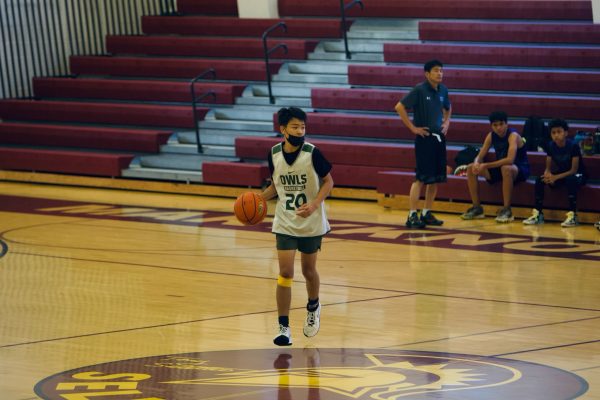The mental game: athletes and emotional health
Two seniors share an encouraging fist bump while playing baseball on May 1.
By Katie Troske, Staff Writer
Naomi Osaka and Simone Biles are two huge names in sports that have brought light to prioritizing mental health in athletes this year.
Connections with others and improvement in health are just two of the many benefits athletes receive from participating in school sports, but it’s easy to become distracted and make a dangerous mistake.
In order to fully utilize abilities, it is important to make sure players are protecting themselves physically and emotionally. Knowing how to maintain a healthy mindset can prevent injuries and help improve their performances.
As many sports seasons start, students become stressed in preparation for tryouts.
“Athletes have an outlet and it helps with their mental health, but there’s also that added pressure,” said Mid-Pacific Counselor Catherine Juliano.
Many people don’t realize that anyone can be affected by mental health, whether in a big or small way.
“Mental health does not discriminate at all, and it affects every single population no matter who you are,” said Juliano.
Most athletes become overwhelmed with pressure, which can interfere with their sport. Being able to manage and cope with these feelings is essential to a player’s health and safety.
“You can’t focus on protecting yourself and giving your best if you have something else on your mind,” said Mid-Pacific Counselor Rachael Brewer.
According to Juliano, the mind and body are very connected. For example, the body is preparing to perform when nervous by raising heart rate and adrenaline. Taking care of the body physically by drinking water, getting enough sleep, and stretching can improve mindset and put athletes in a better place to perform.
Some ways for players to create a positive mindset are to first identify the problem and know what’s creating the stress and weight on their mind.
“If you can name what emotion is going on, then you’re more able to cope with it,” said Juliano.
Next, players can talk to coaches and teammates about problems. Building a support system on a team can help players know they’re not alone in whatever they’re feeling.
“Having that strong relationship in the beginning creates a positive connection, and then the athletes will let you care about them,” said Mid-Pacific girls’ intermediate and junior varsity volleyball coach Jamie Makiya.
A safe environment on a team can help the players feel better about asking for help and support if they need it.
The pressure and responsibility of playing a sport can be really overwhelming, and it can lead to a player not enjoying their sport anymore.
“A lot of the time, winning and being the best is the ultimate focus and goal, but then they often forget about why they started in the first place,” said Makiya.
Practicing coping mechanisms individually and with teammates can improve the way a team performs. Setting aside a time before, during, or after a game to do a mindset check-in is a way to improve the team’s morale and help everyone perform better.
“For sports, everything seems physical, but you need that balance between the mental and the physical in order to perform at your best level,” said Makiya.
Often, a player’s mindset is overlooked because their physical state is considered more important, which can be harmful to the athlete’s safety and performance.
Many athletes will feel alone if they have mental health struggles and they could be pressured by the demand of helping their team and performing well, which may cause them to bottle up their emotions and ignore them.
Athletes need to know they’re not alone in anything they feel. Many athletes around the world struggle with various mental health disorders. In a survey done by the National Collegiate Athletic Association in 2020, 35 percent of athletes will deal with a mental health crisis at some point during their career, and after the COVID-19 pandemic, those numbers were up 150 percent to 250 percent higher than they previously were.
Having resources and outlets is crucial for athletes to maintain their mindset and mental health. Talking to people you trust, taking care of yourself physically, and doing frequent mindset check-ins can all improve your mindset and make stress easier to manage.
It’s also important to remember that athletes aren’t alone. Many struggle with mental health, and it’s okay to reach out for help and support.
If you’re a student-athlete struggling with stress and pressure, send an email to [email protected] and set up an appointment to talk with one of the counselors. You can also refer to online resources, like Athletes For Hope. You aren’t alone.

Katie Troske is a senior and a fourth year journalist. She is also Na Pueo’s editor-in-chief this year. She likes going to the beach, hanging out with...











